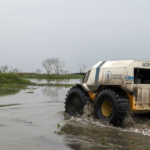
AI-powered robotic vehicles are set to revolutionize the delivery of food parcels to conflict and disaster zones, potentially starting as early as next year. The World Food Programme (WFP) has revealed plans to utilize these robotic vehicles in an effort to protect the lives of humanitarian workers in increasingly dangerous environments.
Attacks against aid workers have been on the rise, coinciding with a surge in violent conflicts worldwide, which is being labeled the highest since World War Two, as stated by the United Nations. Earlier this year, WFP alone lost three workers in Sudan’s conflict, highlighting the urgency to find safer and more efficient methods of delivering aid.
Bernhard Kowatsch, head of the WFP’s innovation department, highlighted the significance of AI-powered robotic vehicles, stating that they can be deployed when it is too perilous to send in human drivers or WFP staff. This technology represents a significant step forward in addressing the challenges faced by aid organizations operating in dangerous and volatile regions.
These AI robotic trucks have the capability to transport up to two tonnes of aid, ensuring that critical supplies reach those in need even in the midst of conflict or natural disasters. By leveraging AI technology, the WFP aims to enhance the efficiency and effectiveness of its operations, ultimately saving more lives and improving the outcomes for those affected by crises.
UN Secretary-General António Guterres emphasized the positive potential of AI, acknowledging its capacity for immense good. He highlighted its ability to drive progress toward the 2030 Agenda and the Sustainable Development Goals. The use of AI in sectors such as healthcare and education has the potential to bring about transformative changes, empowering people worldwide to shape a better future.
As the WFP prepares to deploy AI-powered robotic vehicles for delivering aid in conflict and disaster zones, it marks a significant milestone in the ongoing pursuit of innovation and technology to address humanitarian challenges. By embracing AI advancements, humanitarian organizations can not only enhance their response capabilities but also mitigate risks and safeguard the lives of those on the front lines of delivering critical assistance in challenging environments.
The post AI-powered robotic vehicles to deliver food parcels in conflict and disaster zones, says World Food Programme appeared first on StartupNews.fyi.